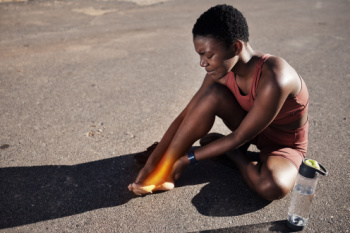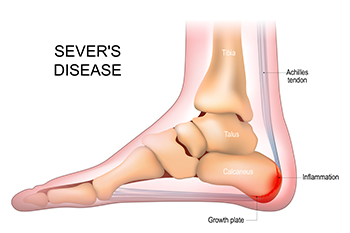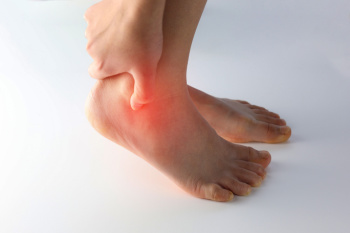Connect With Us
Blog
Items filtered by date: May 2024
Causes of Foot Pain

Foot pain is a common ailment that can stem from a variety of causes, significantly impacting mobility and quality of life. Injuries such as sprains, fractures, and tendonitis are frequent culprits. Various forms of arthritis, including osteoarthritis, rheumatoid arthritis, and gout, can also lead to foot pain due to joint inflammation and damage. Wearing ill-fitting footwear often increases foot discomfort, leading to issues like bunions, which are painful enlargements of the joint at the base of the big toe. Symptoms of foot pain can include a sharp or dull ache, swelling, stiffness, and a reduced range of motion. Typical treatment strategies include rest, and sometimes more targeted therapies like custom orthotic devices. If you have foot pain that persists or is worsening, it is suggested that you schedule an appointment with a podiatrist who can provide a comprehensive assessment and tailored treatment options to alleviate pain and prevent further complications.
Foot Pain
Foot pain can be extremely painful and debilitating. If you have a foot pain, consult with one of our podiatrists from Boca Raton Podiatry . Our doctors will assess your condition and provide you with quality foot and ankle treatment.
Causes
Foot pain is a very broad condition that could be caused by one or more ailments. The most common include:
- Bunions
- Hammertoes
- Plantar Fasciitis
- Bone Spurs
- Corns
- Tarsal Tunnel Syndrome
- Ingrown Toenails
- Arthritis (such as Gout, Rheumatoid, and Osteoarthritis)
- Flat Feet
- Injury (from stress fractures, broken toe, foot, ankle, Achilles tendon ruptures, and sprains)
- And more
Diagnosis
To figure out the cause of foot pain, podiatrists utilize several different methods. This can range from simple visual inspections and sensation tests to X-rays and MRI scans. Prior medical history, family medical history, and any recent physical traumatic events will all be taken into consideration for a proper diagnosis.
Treatment
Treatment depends upon the cause of the foot pain. Whether it is resting, staying off the foot, or having surgery; podiatrists have a number of treatment options available for foot pain.
If you have any questions, please feel free to contact our office located in Boca Raton, FL . We offer the newest diagnostic and treatment technologies for all your foot care needs.
Arthritis Can Cause Pain in the Feet and Ankles
The Versatility of Custom Orthotics

Custom orthotics, often associated with runners or athletes, offer benefits beyond the realm of sports. These specialized shoe inserts are designed to address imbalances in foot structure, which can significantly impact posture and overall body alignment. Even a minor imbalance can lead to problems throughout the body. Orthotics may be beneficial if you notice uneven wear on the soles of your shoes or have frequent ankle sprains. Chronic pain in the heels, misaligned toes, or abnormal foot positioning during walking are other reasons that orthotics may be needed. By providing support and stability, orthotics help distribute weight more evenly across the foot, reducing strain on muscles and joints. They can correct biomechanical issues, improve gait efficiency, and alleviate discomfort associated with various conditions. Whether you are an athlete or someone seeking relief from everyday discomfort, custom orthotics offer a simple yet effective solution to enhance foot function and promote overall well-being. If you are interested in learning more about how custom-made orthotics can help you, it is suggested that you consult a podiatrist.
If you are having discomfort in your feet and would like to try orthotics, contact one of our podiatrists from Boca Raton Podiatry . Our doctors can provide the care you need to keep you pain-free and on your feet.
What Are Orthotics?
Orthotics are inserts you can place into your shoes to help with a variety of foot problems such as flat feet or foot pain. Orthotics provide relief and comfort for minor foot and heel pain but can’t correct serious biomechanical problems in your feet.
Over-the-Counter Inserts
Orthotics come in a wide variety of over-the-counter inserts that are used to treat foot pain, heel pain, and minor problems. For example, arch supports can be inserted into your shoes to help correct overarched or flat feet, while gel insoles are often used because they provide comfort and relief from foot and heel pain by alleviating pressure.
Prescription Orthotics
If over-the-counter inserts don’t work for you or if you have a more severe foot concern, it is possible to have your podiatrist prescribe custom orthotics. These high-quality inserts are designed to treat problems such as abnormal motion, plantar fasciitis, and severe forms of heel pain. They can even be used to help patients suffering from diabetes by treating foot ulcers and painful calluses and are usually molded to your feet individually, which allows them to provide full support and comfort.
If you are experiencing minor to severe foot or heel pain, it’s recommended to speak with your podiatrist about the possibilities of using orthotics. A podiatrist can determine which type of orthotic is right for you and allow you to take the first steps towards being pain-free.
If you have any questions please contact our office located in Boca Raton, FL . We offer the newest diagnostic and treatment technologies for all your foot and ankle needs.
Sever’s Disease Affects Young Feet

Sever's disease, also known as calcaneal apophysitis, is a common condition affecting children and adolescents, particularly those who are active in sports. Contrary to its name, Sever's disease is not a true disease but rather an inflammation of the growth plate in the heel bone. This inflammation occurs due to repetitive stress or tension on the growth plate, often during periods of rapid growth. As a result, the heel becomes painful and tender, especially during physical activities like running or jumping. Despite its discomfort, Sever's disease does not cause long-term damage and typically resolves once the growth plate closes. However, proper management is critical to alleviate symptoms and prevent recurrence. Treatment may involve rest, stretching exercises, wearing supportive footwear, and in severe cases, temporary activity modification. If your child has heel pain and enjoys participating in sporting activities, it is suggested that you consult a podiatrist who can accurately diagnose and treat Sever’s disease.
Sever's disease often occurs in children and teens. If your child is experiencing foot or ankle pain, see one of our podiatrists from Boca Raton Podiatry . Our doctors can treat your child’s foot and ankle needs.
Sever’s Disease
Sever’s disease is also known as calcaneal apophysitis, which is a medical condition that causes heel pain I none or both feet. The disease is known to affect children between the ages of 8 and 14.
Sever’s disease occurs when part of the child’s heel known as the growth plate (calcaneal epiphysis) is attached to the Achilles tendon. This area can suffer injury when the muscles and tendons of the growing foot do not keep pace with bone growth. Therefore, the constant pain which one experiences at the back of the heel will make the child unable to put any weight on the heel. The child is then forced to walk on their toes.
Symptoms
Acute pain – Pain associated with Sever’s disease is usually felt in the heel when the child engages in physical activity such as walking, jumping and or running.
Highly active – Children who are very active are among the most susceptible in experiencing Sever’s disease, because of the stress and tension placed on their feet.
If you have any questions, please feel free to contact our office located in Boca Raton, FL . We offer the newest diagnostic and treatment technologies for all your foot and ankle injuries.
Causes and Symptoms of Tarsal Tunnel Syndrome

Tarsal tunnel syndrome is a condition caused by repeated pressure on the posterior tibial nerve near the ankle. It can lead to debilitating symptoms such as pain, numbness, or tingling sensations, often radiating into the sole of the foot or inside the ankle. This compression occurs within the tarsal tunnel, which is a narrow passageway bound by bone and soft tissue. Tarsal tunnel syndrome's origins include severely flat feet, benign bony growths, and varicose veins. Inflammation from arthritis, lesions or masses near the tibial nerve, and trauma from ankle sprains or fractures also may cause tarsal tunnel syndrome. Patients with conditions like diabetes are at further risk. Left untreated, tarsal tunnel syndrome can cause permanent and irreversible nerve damage that may affect mobility and hinder completing daily activities. If you suspect you may be experiencing symptoms of tarsal tunnel syndrome, it is suggested that you schedule an appointment with a podiatrist for a comprehensive evaluation and treatment plan.
Tarsal tunnel syndrome can be very uncomfortable to live with. If you are experiencing tarsal tunnel syndrome, contact one of our podiatrists of Boca Raton Podiatry . Our doctors can provide the care you need to keep you pain-free and on your feet.
Tarsal Tunnel Syndrome
Tarsal tunnel syndrome, which can also be called tibial nerve dysfunction, is an uncommon condition of misfiring peripheral nerves in the foot. The tibial nerve is the peripheral nerve in the leg responsible for sensation and movement of the foot and calf muscles. In tarsal tunnel syndrome, the tibial nerve is damaged, causing problems with movement and feeling in the foot of the affected leg.
Common Cause of Tarsal Tunnel Syndrome
- Involves pressure or an injury, direct pressure on the tibial nerve for an extended period of time, sometimes caused by other body structures close by or near the knee.
- Diseases that damage nerves, including diabetes, may cause tarsal tunnel syndrome.
- At times, tarsal tunnel syndrome can appear without an obvious cause in some cases.
The Effects of Tarsal Tunnel Syndrome
- Different sensations, an afflicted person may experience pain, tingling, burning or other unusual sensations in the foot of the affected leg.
- The foot muscles, toes and ankle become weaker, and curling your toes or flexing your foot can become difficult.
- If condition worsens, infections and ulcers may develop on the foot that is experiencing the syndrome.
A physical exam of the leg can help identify the presence of tarsal tunnel syndrome. Medical tests, such as a nerve biopsy, are also used to diagnose the condition. Patients may receive physical therapy and prescriptive medication. In extreme cases, some may require surgery.
If you have any questions please feel free to contact our office located in Boca Raton, FL . We offer the newest diagnostic and treatment technologies for all your foot and ankle needs.

